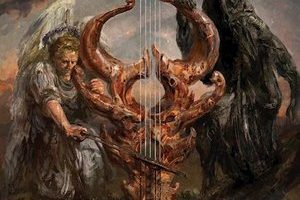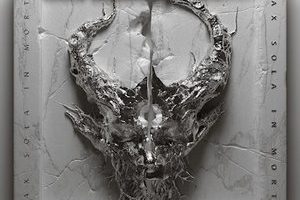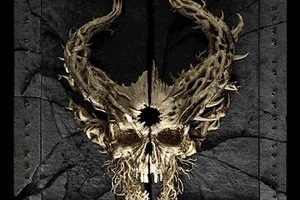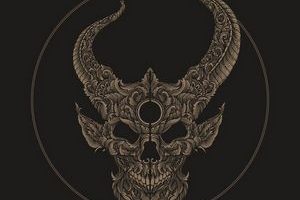Demon Hunter – Weathering the Storm
Tuesday, 18th April 2017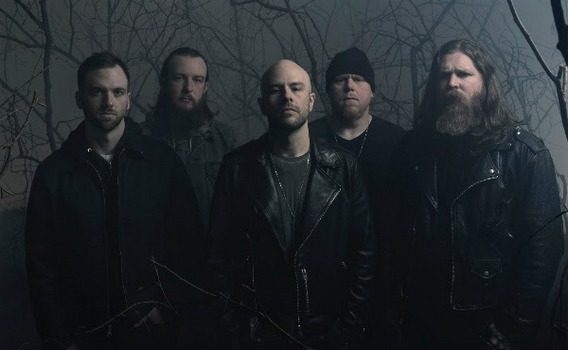
Rising up with one of the iterations of MTV’s Headbanger’s Ball with a video for “Infected,” from their self-titled debut, the band found themselves lumped in with the growing metalcore movement of the times. But as those bands began to wither and fade away, Demon Hunter continued to stand tall, and it became more apparent that there was more substance and appeal for the band than some had assumed. The band has continued to stay relevant (and successful) in the times since, with its recently released eighth album, Outlive, hitting some new high-water marks for the band.
Outlive continues the format that the band’s fans have become accustomed to over the years. Heavy grooves, strong melodies, and Ryan Clark’s soaring cleans and more brutal shouts. Also of relevance is the band’s Christian themes, an outre stance for a metal act, but one that the band has stood behind and carried the torch for, genuinely and consistently, over the years. Vocalist Clark was able to take a few moments and discuss Outlive’s finer points, the Demon Hunter logo, the challenges of being a Christian metal band, and more.
Dead Rhetoric: Outlive represents the longest wait you’ve had between albums. Does the title itself represent some of the struggles in putting together a new album as life put more responsibilities in your path?
Ryan Clark: That definitely has a lot to do with it. The title Outlive seemed to be appropriate on a number of levels. As for the band and the music, it seems as though we’ve weathered the storm in many ways… and we’ve outlived many of the bands that were coming up alongside us in the early 2000s. We’ve done our best to skirt fleeting trends, and I think that’s allowed us to avoid a typical shelf life.
But it does have to do with our personal lives more than anything. Life has thrown quite a lot at the five of us in the last 3 years, so themes like mortality and legacy are at the forefront of subjects explored on the album.
Dead Rhetoric: Is there anything that you feel defines Outlive apart from what you have done in the past?
Clark: I think we’ve achieved what we set out to, which is to create a definitively Demon Hunter-sounding album, while pushing the boundaries of exactly what that is. On one hand, we’re comfortable playing within the template we’ve created… on the other, it’s important that we attempt to push forward with each record.
The biggest changes on Outlive would have to do with the songwriting. Patrick wrote a handful of incredible songs for Outlive, five of which made it on the album. This marks the first time I’ve collaborated with someone else since my brother, Don, left the band in 2008. Patrick’s songs are definitely more technical than mine, so there’s an apparent stylistic change that I believe many people will pick up on. It was really freeing for me to focus on the lyrics and vocal melodies for these songs, and they ended up being my favorites on the record.
Aside from this, I believe the most noticeable change would be the ratio of screaming to singing. Although there is less somber balladry on this than on previous DH albums, singing (as opposed to screaming) occupies a larger space than what’s most common for us.
Dead Rhetoric: You continue to collaborate with Aaron Sprinkle. Is he more or less a fixture for the band? Does your work with him help keep Demon Hunter’s vision consistent?
Clark: Although Aaron was less involved on Outlive than on previous albums, it’s really his wisdom throughout the past 15 years that has shaped what we do. There are so many decisions that I make when writing and recording songs, many of which attempt to answer the question, “what would Aaron do?” I think it’s actually become somewhat second-nature for me to think in a way that channels his expertise. Structure, song length, when to scale back, when to ramp up, vocal melody… and just generally thinking outside-the-box. I’ve worked with him for so long, and I’m always trying to soak up as much of his knowledge as I can, it’s now engrained in my songwriting outlook.
Dead Rhetoric: What made you decide to go with the PledgeMusic route for your Outlive pre-orders?
Clark: After Extremist, we were out of our record deal with Solid State. We’ve since re-signed with the label, but in the time between albums we knew crowdfunding was going to be a great way to handle the pre-sale. We’ve made a habit of releasing deluxe editions and merch bundle pre-orders for about 5 albums now. In the past, ordering the correct quantities was always a guessing game. By crowdfunding, we’re given the ability to make much more accurate estimations on these quantities. And the more you know about your projected quantities, the much easier it is to plan accordingly. In short, having people commit up front eliminates waste and allows us to ultimately do more because there’s less risk.
Dead Rhetoric: Each album has focused on the Demon Hunter logo in some fashion. Does having a unique logo add to easier band identification and/or a rallying point for fans?
Clark: The DH logo predates the music. Our vision for the band was focused on the branding and visualization from the very start, and although we’ve done the logo in many different ways, consistency has always been important.
Much of this just comes with my work outside of music. I’ve been a professional designer and/or art director for the past 17 years, so placing a great deal of importance on the visual aspects of the band is just second-nature to me. It’s all one in the same. Yes, the music itself is of paramount importance, and it must be great, but why shouldn’t everything else follow suit? I think a lot of musicians see visual aesthetic as an afterthought. It’s the ones that truly cultivate an amazing visual experience (along with great music) that stand the test of time – at least to me. I find myself more drawn to artists that have a certain degree of high-quality continuity throughout everything they release.
To answer your question more directly: Yes. By maintaining visual consistency, we believe everything we do is strengthened. There’s less guess work; things seem more deliberate. At this point, you could say it’s “tried and true.” We’re very fortunate to have something that worked 15 years ago and still works today.
Dead Rhetoric: Your earlier days had you clearly marked in the metalcore crowd, but one couldn’t say the same for your last few albums. Was there a conscious effort to move further away from that sound as you evolved as a band?
Clark: I’ve never been entirely comfortable with that genre label. It seemed so fleeting… and when I think of that term, I just think of 1000 bands trying to sound like Killswitch or something. We came from the hardcore scene… but we were funneling that through a lifelong love of metal… so naturally, that comes out somewhere in the metalcore ballpark. But I think skirting the typicality of the metalcore sound has helped keep us afloat all these years.
In the beginning, it was our abilities (mainly in the guitar department) that kept us from doing what bands like As I Lay Dying or Unearth were doing. We couldn’t keep up with them on a technical level, so we focused more on vocal melody and pop song structure. With the addition of Patrick Judge on The World Is A Thorn, the ceiling for ripping guitars was shattered… but then again, I was writing the bulk of the material, so the more elaborate guitar work would only shine through in small parts (solos, etc.).
Now that we’re working within our own blueprint, we’re comfortable pushing those boundaries. We’re definitely more technical today than ever before, but I’m always careful not to take that too far because at the end of the day, it’s just not what I’m into. 9 times out of 10, I’d much rather opt for a big, nasty groove than a super showy guitar lick.
Dead Rhetoric: Lyrics have always been a high water mark with Demon Hunter over the years. Do you find it more challenging to keep to the level that you’ve done with each successive release?
Clark: The most challenging part of writing lyrics for me is always regurgitation. After 100+ songs, it can be difficult to find untapped concepts. That’s one good thing about taking a bit of a breath between releases–we all had time to experience life–and these new experiences are perfect fuel for drumming up fresh ideas.
Again, it comes down to consistency. Why stop at high quality music and vocal delivery? I take a lot of pride in putting so much effort into the lyrics. For us, it’s a much bigger piece of the puzzle than it is for other bands because we’ve put so much emphasis on it. It’s extremely important to me that our lyrics resonate with listeners. Not just that they sound clever or catchy… but that they illuminate something real about the human condition. I think of how music speaks to me – sure, I love plenty of bands whose lyrics I don’t really care about… but the bands that I can also relate to on a deeper level make a real lasting impression.
Dead Rhetoric: If someone listens to Demon Hunter for the first time, what do you hope they take away from your music?
Clark: For a lot of people, we’ve been a gateway into metal. I think we have enough melody and structure to appeal to a lot of people that might not be natural metal heads, and that’s great. Ideally, we’d have a bit of this, as well as a general sense of respect from the more seasoned metal enthusiast. As much as I don’t aspire to be everything to everybody, it is nice to know that people with all variations of taste are able to pull something they really like from Demon Hunter. Although I grew up in the metal and hardcore scenes, I myself am not a typical metal head, so I think it’s natural that I would want to bridge some of the gaps between genres.
Dead Rhetoric: Do you feel the band, despite your successes over the years, gets a bum rap from a portion of the metal community because you identify as Christian?
Clark: I’m fully aware that the concept of Christianity is bizarre for much of the metal community, even laughable to some. Having come from the hardcore scene, where speaking your mind is a bit more celebrated, I like to think there is a place in any genre for a less-typical stance. Demon Hunter has always thrived on that opposition, so it’s hard to complain about it. I’m a firm believer that anything worth saying will invite adversity, and it’s this adversity that presents me with a welcome challenge. If I can do anything to change peoples’ preconceived notions about Christianity or Christian people, then I feel we’ve succeeded.
Dead Rhetoric: Likewise, due to the abrasiveness of the band name and logo, was it initially tough to convince the Christian music crowd of your intentions? Do you feel that it has solidified your faith?
Clark: One of the biggest reasons I started playing music centered around my beliefs is because I wanted to change what I hated about the “scene.” It’s no wonder to me that it’s usually met with snickering skepticism. That is a byproduct of just how corny we’ve allowed it to become. In most cases Christian music is, at best, an insulated bubble of forced smiles and exclusive rhetoric… but the truth, which is more thinly veiled than “we’d” like to admit to, is that it is devoid of real humanity. To avoid the gritty, ugly details of life is to undermine the human condition altogether. Some Christian artists may view overt-directness as the only acceptable way to formulate the message, but I would argue that it’s nearly impossible to gain someone’s interest–much less their trust–by starting the conversation of faith before connecting with them on a human level.
Dead Rhetoric: In a genre where there’s a lot of turn-over, what’s allowed Demon Hunter to stay a viable and successful band over the years?
Clark: I believe there are many factors that have contributed to our longevity. Off the top of my head, here are some:
1. We don’t tire of the band because we aren’t constantly active.
2. The (in)frequency of our activity allows us to be more strategic than most.
3. We don’t all live in the same state, so when we do get together it’s always fun.
4. We’ve built the band upon real friendships. Whenever we’ve diverted from this, it fails.
5. Our desire to connect with fans supersedes our desire to create music for our own fulfillment.
6. In most cases, I believe we bend over backwards to give fans more than the average band.
7. We’ve built a consistent, reliable brand, musically and visually, which has stood the test of time.
8. I toil over every granular detail of the band’s output. It sounds simple enough, but I rarely see this practiced by other bands.
9. We’ve done our best to avoid musical trends, which I believe has kept us relevant despite what’s en vogue at the time.
10. We are, in most ways, a self-reliant, self-sustaining entity. We have, within the band itself, a professional producer/engineer, art director/designer, photographer, video producer, marketer, etc. And I don’t mean we do these things as hobbies. These have all been professions of ours.
Dead Rhetoric: You also work as a graphic designer and have done artwork for the band, as well as others. Do you get inspiration from one side, either the band or the art, that aids with the other?
Clark: The two sides definitely inform one another. Since a great deal of my design work has been for bands, I know what it’s like on both sides, so this allows me to speak with a certain degree of authority when I’m pitching a logo or album artwork. Likewise, my experience as a designer has given me a great deal of knowledge surrounding the importance of branding and overall consistency of aesthetic, which I can apply to Demon Hunter and client work alike.
The best part of playing both of these roles is the ability to flesh out ideas immediately. I’m constantly exploring visual concepts for albums way ahead of time, which allows me a ton of time to get them right. I find that when I’m thinking through the music and design simultaneously, the final product feels much more cohesive.
Dead Rhetoric: Given the much of the band’s newfound fatherhood since the last album, is there going to be a different plan in terms of touring in the band’s future? Is there anything planned at the moment?
Clark: We’re in the early stages of this, so it’s hard to know how it will pan out with our touring schedule. At the moment, we have a pretty minimal batch of shows for the year, but we’re hoping to fill that out a bit more in the coming months.











